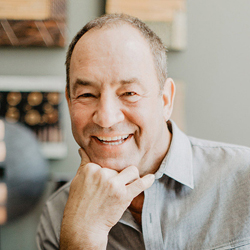 For the 2018 Relational Perspectives Series, November 9-10, The Seattle School will welcome Dr. Annie Rogers, a psychoanalyst, writer, and professor, for a Friday evening lecture open to the public and a Saturday workshop reserved for students and alumni. Dr. Rogers is an internationally esteemed psychoanalyst, and she is beloved in the Seattle School community—her work, particularly A Shining Affliction, has been a compelling and pivotal part of the curriculum offered by Dr. Roy Barsness, Professor of Counseling Psychology, for 15 years.
For the 2018 Relational Perspectives Series, November 9-10, The Seattle School will welcome Dr. Annie Rogers, a psychoanalyst, writer, and professor, for a Friday evening lecture open to the public and a Saturday workshop reserved for students and alumni. Dr. Rogers is an internationally esteemed psychoanalyst, and she is beloved in the Seattle School community—her work, particularly A Shining Affliction, has been a compelling and pivotal part of the curriculum offered by Dr. Roy Barsness, Professor of Counseling Psychology, for 15 years.
Dr. Barsness founded the Relational Perspectives Series with the vision of creating an intimate, accessible environment to engage with relational and analytic theorists and clinicians who are contributing innovative, compelling work to the fields of psychology and psychotherapy. Here, we talk with him about his heart for the annual series and his particular excitement about bringing Dr. Rogers to The Seattle School.
How did the Relational Perspectives Series first come to life?
The vision for the Relational Perspectives Series emerged from an idea that I had to invite theorists and practitioners whom students were reading in my courses, and who were contributing to students’ overall clinical development. I established the Series as a Friday evening community lecture in partnership with the Northwest Alliance for Psychoanalytic Study and an all-day Saturday teaching seminar for students and alumni. The launch of the first lecture in 2008 was Dr. Karen Maroda, a favorite author among the students, and subsequent guests have included Lew Aron, Steven Knoblauch, Brad Strawn, Earl Bland, and others.
How do the guests you bring in, and the conversations at these events, contribute to the ongoing learning that students are engaging?
I believe having a direct experience with an author of a text, and the ability to personally ask the writer questions about their theory and practice, deepens the learning process. Also, to have the author supervise a case in the Saturday seminar demonstrates in vivo how the theory is fleshed out in actual practice from that particular theorist’s view. It also provides a personal attachment and identification with the author and, I believe, increases the likelihood of continued study of that author.
You mentioned that the evening lecture each year is presented in partnership with the Northwest Alliance for Psychoanalytic Study (NWAPS). What makes that such a meaningful collaboration year after year?
Since the inception of the Relational Perspectives Series, a primary goal has been to connect our training efforts with the psychological community at large. Given my long association with NWAPS both as a Board member and a life-long member, NWAPS was the natural portal to our collaboration. It has been successful on two fronts: members in the community have been given access to our robust analytic training program, as well as opportunities to offer post-graduate supervision and psychotherapy, and our students have been connected to a post-graduate community that continues to support them and educate them. The success of the collaboration is also evidenced in how our alumni have assumed significant leadership roles with NWAPS.
When did you first encounter the work of Annie Rogers?
Annie came to my attention in 2004 in my reading of her memoir, A Shining Affliction. It had been used in other Seattle School classes prior to my reading, and it seemed to fit well in the overall goals of the Therapy I and II curriculum, so I built it into that class.
What makes Dr. Rogers a good fit for this series?
Annie’s story resonates very strongly with our students in their recognition that in relational work, it is often in our woundedness that we are most sensitive and available to the afflictions of others. In this text, students are encouraged to value, rather than hide, their vulnerabilities. Furthermore, the text offers two different “versions” of an analysis, with one of the therapist’s demonstrating an excellent example of relational psychotherapy.
“It is often in our woundedness that we are most sensitive and available to the afflictions of others.”
For many students, A Shining Affliction is a pivotal part of their time at The Seattle School. Why do you think Dr. Rogers’ stories and perspectives resonate so deeply with what we are learning here?
Annie’s stories (and I am finding the same in my communications with her) are deeply personal and profound, and they reach deep into our own psyches and our own woundedness. Furthermore, she is highly ethical and demonstrates the power of change through genuine interpersonal encounters.
What are your hopes for people who come to hear Annie Rogers and join this conversation?
I hope that we will all be moved by her story to consider our own, that we will be reminded how deeply complicated the therapeutic process is, and that we will reflect upon what a sacred thing it is to be given the task of birthing new life in the other, through the complexity of deep relating with another human being.

